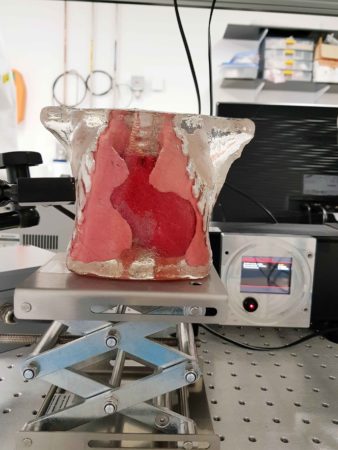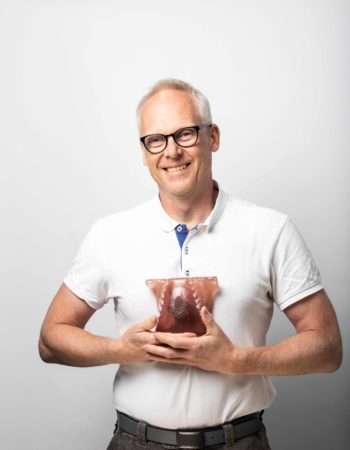20 November 2020
By Elaine Murphy
elaine@TheCork.ie
The INFANT Research Centre University College Cork (UCC), in collaboration with IPIC at Tyndall National Institute, are working on a new project called NIOMI (Non-Invasive lung Oxygen Monitoring of Infants).
The NIOMI study research team is developing a new optical system for monitoring lung function in newborn infants. Currently, there is no such device able to detect lung oxygen concentrations. The new device has the potential to provide continuous information on lung function and reduce the need for x-ray exposure. The newly developed non-invasive optical device applies small probes on a baby’s chest to detect oxygen levels and evaluate lung aeration, providing the clinical team with real-time information on the underlying lung status. In the future non-harmful, easy-to-use laser technology will improve the management of newborn infants with breathing problems, particularly premature babies.
INFANT Research Centre UCC plan to perform a clinical trial at Cork University Maternity Hospital in 2021 when they will assess the technology in healthy term infants over the first days of life. These measurements will provide insight into normal lung oxygenation in healthy term infants for the future perspectives.
Director of the INFANT Research Centre and Professor of Neonatal Physiology at UCC, Geraldine Boylan commented; ‘’INFANT has an established track record of integrating clinical disciplines in maternal and child health with scientific and engineering expertise – both in-house and through collaborating with our colleagues in Tyndall. This multi-disciplinary approach is critical to develop ground-breaking medtech innovations that can have real clinical impact. Technology without translation will not deliver the societal and economic impact for the investment in research and support which SFI, the HSE and the DoFHERIS has provided.”
Professor Eugene Dempsey is Clinical Lead for Neonatal Research and Principal Investigator with INFANT Research Centre, UCC, added further comment: ‘’I hope that in the future, this new optic system will improve the detection, diagnosis and treatment of newborn infants, particularly premature babies born with reduced lung function. Premature infants are at increased risk of requiring breathing support due to the underlying lung immaturity- this technology has the potential to change the way we manage these babies, help to avoid invasive mechanical ventilation and reduce longer-term lung problems.
IPIC Centre Director at Tyndall National Institute Paul Townsend said, “We were delighted to work with the INFANT Research Centre UCC to develop innovative technologies to improve lung oxygen monitoring in neonatal babies. The technique is known as GASMAS, which uses near-infrared light to measure the lung oxygen concentration. This exciting work shows how light and our research programme are providing solutions to help the most vulnerable patients. The support of Science Foundation Ireland and the Department of Further and Higher Education, Research, Innovation and Science has been vital to this ongoing success.”
The technology was show on last week’s RTE Science documentary ‘Ten things to know About’. To view please click here RTE Player 10 Things To Know About.
Photonics — or the science and application of light — is considered to be one of the key technologies of the 21st century. The Irish Photonics Integrated Centre (IPIC) at Tyndall is Ireland’s centre of excellence for research, innovation and PhD training in photonics. Their work ranges from photonics theory right through to device development and fabrication, enabled by our world-class laboratories and semiconductor fabrication facilities at Tyndall. They work closely with over 30 industry partners to develop next-generation products across high growth technology sectors and to commercialise our disruptive technologies, delivering commercial and research impact.
The Irish Centre for Maternal and Child Health Research (INFANT) is Ireland’s first translational research centre focused entirely on pregnancy, birth and early childhood. Founded on over a decade of awarding winning collaborative research and core funding from Science Foundation Ireland’s (SFI), INFANT is now home to a truly diverse multidisciplinary team of close to 100 whose work encompasses a wide variety of closely integrated research themes, spanning bench to bed and cot-side.


